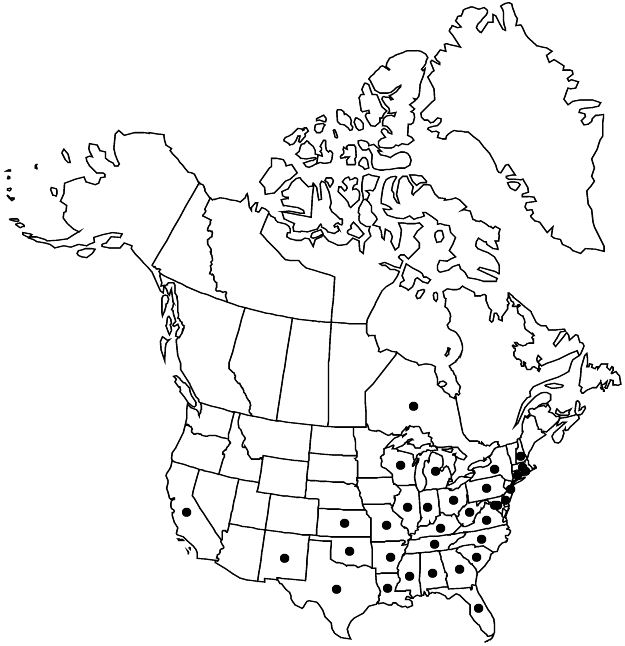Difference between revisions of "Hibiscus moscheutos"
Sp. Pl. 2: 693. 1753.
imported>Volume Importer |
RevisionBot (talk | contribs) m (Bot: Adding category Revised Since Print) |
||
| (2 intermediate revisions by 2 users not shown) | |||
| Line 55: | Line 55: | ||
|publication year=1753 | |publication year=1753 | ||
|special status= | |special status= | ||
| − | |source xml=https:// | + | |source xml=https://bitbucket.org/aafc-mbb/fna-data-curation/src/2e0870ddd59836b60bcf96646a41e87ea5a5943a/coarse_grained_fna_xml/V6/V6_472.xml |
|subfamily=Malvaceae subfam. Malvoideae | |subfamily=Malvaceae subfam. Malvoideae | ||
|genus=Hibiscus | |genus=Hibiscus | ||
| Line 61: | Line 61: | ||
}}<!-- | }}<!-- | ||
| − | -->[[Category:Treatment]][[Category:Hibiscus]] | + | --> |
| + | |||
| + | [[Category:Treatment]] | ||
| + | [[Category:Hibiscus]] | ||
| + | [[Category:Revised Since Print]] | ||
Latest revision as of 17:12, 6 November 2020
Herbs, perennial, to 2.5 m. Stems glabrous or variously hairy, but without line of curved hairs. Leaves: stipules subulate, 1–4 mm; petiole 1/4–3/4 blade, glabrate or finely hairy; blade narrowly to broadly lanceolate to triangular-ovate or orbiculate, 3-lobed or unlobed, 8–20 × 3–13 cm, base cordate to cuneate, margins crenate to dentate or serrate, apex acute to acuminate, surfaces variously hairy, sometimes glabrous adaxially, nectary absent. Inflorescences solitary flowers in axils of distal leaves, pedicels of later-produced flowers often adnate to subtending petioles. Pedicels variously jointed sub-basally to distally, 2–15 cm, 1/2–1 1/2 as long as petiole, glabrate or finely hairy; involucellar bractlets [8–]10–14[or 15], linear-lanceolate, 0.5–4.5(–5) cm, margins ciliate or not, hairy. Flowers ± horizontal to slightly declinate; calyx divided 1/2–2/3 length, broadly campanulate, 1.5–4 cm, somewhat larger in fruit, lobes triangular or triangular-ovate, apices acute to subcaudate, surfaces hairy, nectaries absent; corolla funnelform to broadly so, petals pink or white, sometimes with red spot basally, narrowly to broadly, obliquely obovate, 4–12 × 3.5–6.5 cm, margins repand, sometimes undulate, minutely hairy abaxially mostly where exposed in bud; staminal column straight, white or cream, 1.2–5 cm, to 1/2 as long as petals, bearing filaments nearly throughout, free portion of filaments not secund, 2–8 mm; pollen yellow; styles white, 10–40 mm; stigmas creamy white to yellow. Capsules dark brown, ovoid to subglobose, 1.4–3.5 cm, apex apiculate, glabrous or hairy. Seeds brown, reniform-globose, 2.5–3 mm, verrucose-papillose. 2n = 38.
Distribution

Ont., Ala., Ark., Calif., Conn., D.C., Del., Fla., Ga., Ill., Ind., Kans., Ky., La., Mass., Md., Mich., Miss., Mo., N.C., N.H., N.J., N.Mex., N.Y., Ohio, Okla., Pa., R.I., S.C., Tenn., Tex., Va., W.Va., Wis., n Mexico, introduced in Europe (sw France, n Italy, nw Portugal), Asia (Georgia).
Discussion
Subspecies 2 (2 in the flora).
Selected References
None.
Key
| 1 | Capsules glabrous; involucellar bractlets usually not ciliate; leaf blade surfaces usually glabrous adaxially; mostly e of Mississippi River. | Hibiscus moscheutos subsp. moscheutos |
| 1 | Capsules hairy; involucellar bractlets usually ciliate; leaf blade surfaces usually hairy adaxially; mostly w of Mississippi River, Florida. | Hibiscus moscheutos subsp. lasiocarpos |